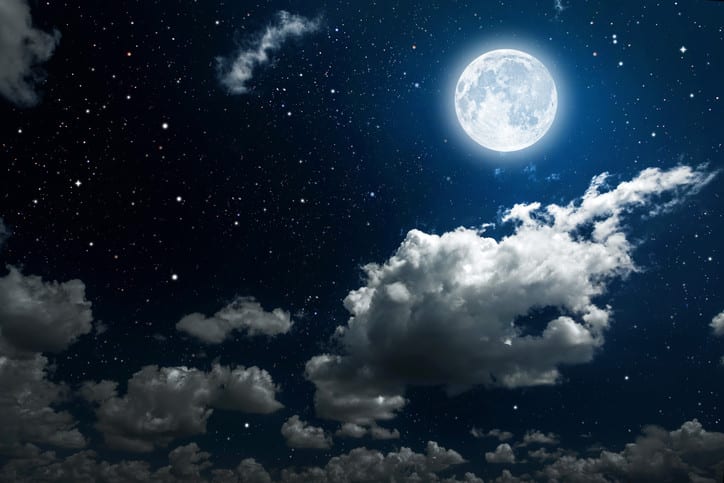Does the moon affect the human mind and body?
August 17, 2017

Over time there has been a great deal written about the moon’s phases and its correlation with human’s minds and bodies. Medical professionals often report that more injuries occur during a full moon, and law enforcement officers note that people often point to the full moon as an explanation of their “bad behavior.”
Did you know that a connection between the moon’s cycles and worsening psychiatric symptoms has been drawn since the middle ages? As recently as the 19th century, English lawyers actually used the full moon as a defense for their clients. But does this really have any merit? How exactly can the moon affect us — or not?
“Full Moon” Behavior: Fact or Fiction?
In spite of a great deal of anecdotal evidence, numerous scientific studies haven’t found a definitive correlation between the full moon and unusual behavior.
In 2005, researchers from the Mayo Clinic found no increase in the number of visits to a psychiatric emergency department they studied during the three nights when the moon was full as compared to other nights.
However, Elizabeth Loftus, a professor who teaches cognitive science at UCI, did concede that perhaps the full moon makes people who are already mentally unstable feel a bit more uneasy than usual, which might cause them to act out in unusual ways.
Oh, and what about births? Well, while you may hear ER doctors and nurses say they see more births on a full moon, the evidence just doesn’t support that claim at this time.
In fact, a 2005 study published in American Journal of Obstetrics and Gynecology analyzed almost 570,000 birth certificates over a 5 year-period and across 62 lunar cycles found “no predictable influence” of the lunar cycle on frequency of births. It also found no significant differences in birth complications.
Lunacy and the Lunar Cycle
The words “lunacy” and “lunar” even sound very similar, so it was wasn’t a far stretch for people to forge a connection between them when there really isn’t one scientifically proven. A meta analysis published in Psychological Bulletin in 1985 sifted through 37 studies and found that only one percent of those manic behaviors that some call “lunacy” could be traced to the full moon. The types of incidents the researchers were looking for included homicides, mental hospital admissions, crisis calls, psychiatric disturbances and similar behavior.
Medical Malarkey?
In spite of what medical professionals indicate as noted above, the scientific evidence has not upheld their belief that emergency visits spike during a full moon. Instead, researchers reported in the American Journal of Emergency Medicine that they examined nearly 151,000 emergency room visits and discovered that the number did not increase during a full moon. There was also no noticeable increase in negative surgery outcomes during a full moon.
Pets and the Full Moon
While research indicates there is no connection between the full moon and human minds and bodies, the same cannot be said about animals. Researchers from the Colorado State Veterinary Medical Center noted that emergency room visits increased by 23 percent for cats and 28 percent for dogs. This conclusion was reached after the study of 11,940 cases though it didn’t speculate on the cause.
Why Do Some Moon Myths Persist?
It’s possible this may simply be the result of “cognitive bias.” In other words, if you expect something to occur — such as people acting more strangely or things being more hectic in ERs or police precincts on nights of full moons — you’re more likely to notice or interpret what happens in a way that backs up your expectations. Nights may be equally chaotic on many other evenings without a full moon, but our minds are not predisposed to chalk those nights up to unusual phenomena. Therefore, we’re less likely to remember them as odd or “different.” It’s a common human tendency to absorb all the evidence that supports our beliefs, and disregard evidence that does not.
Urgent Care Centers Nearby
Do you have a “full moon” story? We’d love to hear it — share it with us on Facebook or Twitter! Even though the moon’s cycles don’t appear to have a direct impact on human behavior, CareSpot is here to serve your medical needs during full moons and any other time of the year. Browse our convenient locations to find one near you.
